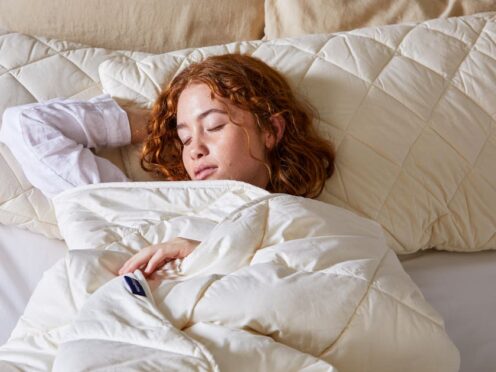
Some 60% of Britons are getting no more than six hours of sleep a night, despite NHS guidelines suggesting that a healthy adult usually needs between seven and nine hours, a survey suggests.
More than four fifths of people (83%) say that getting a regular, good night’s sleep is the most important factor in their general wellbeing, the poll for wool bedding firm Woolroom found.
Two fifths of those polled (40%) reported heightened stress levels after a bad night’s sleep and 36% said they felt anxious, with 40% saying they felt this way one to two times a week and 7% having this feeling constantly.
Some 22% said they had sought professional help due to the ongoing effects of poor sleep.
Fluctuating in temperature was one of the main causes of disrupted sleep, reported by 20% of respondents, while 24% said they were unable to get comfortable and 23% said stress prevented them from sleeping.
One in 10 said their partner’s snoring kept them awake.
Woolroom found peri-menopausal and menopausal women are losing on average more than two hours sleep a night – or roughly two nights sleep per week due to their symptoms.
Respondents reported suffering from poor sleep due to their menopausal symptoms for an average of four years, with only 1% of respondents saying their symptoms did not disrupt their sleep at all.
The survey also suggests that 15% of people wash their mattress protector, duvet and pillows once a week, 20% once a fortnight and 11% every few months.
Some 8% wash their bedding once a year, 3% every two years and 10% never wash it at all.
Woolroom managing director Chris Tattersall said: “By creating the Clean Sleep Report, we wanted to understand the nation’s attitude towards sleep and their awareness of the sleep environment’s impact on our health and planet.
“What has emerged from the survey findings is that there is a clear disconnect between people’s attitude towards sleep and the amount and quality they’re actually getting.
“We also uncovered a striking disparity between people’s perception of the importance of sleep and their understanding of the environmental impact of their bedding choices.”
Mortar Research surveyed 2,057 adults between January 25-29.

Enjoy the convenience of having The Sunday Post delivered as a digital ePaper straight to your smartphone, tablet or computer.
Subscribe for only £5.49 a month and enjoy all the benefits of the printed paper as a digital replica.
Subscribe